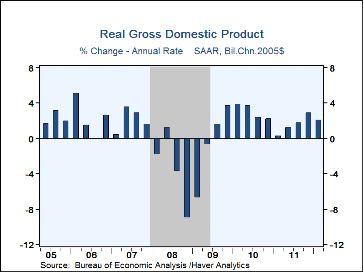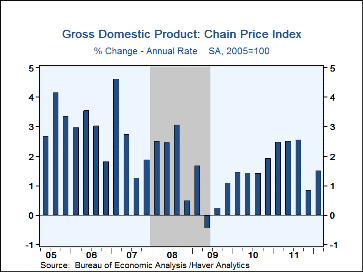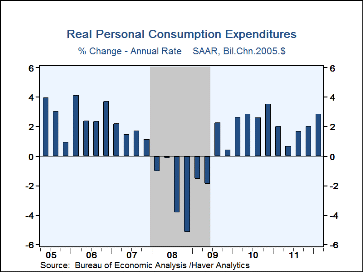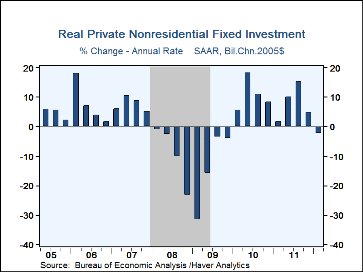 Global| Apr 27 2012
Global| Apr 27 2012U.S. GDP Growth Is Disappointing
by:Tom Moeller
|in:Economy in Brief
Summary
Economic growth slipped back onto the slow track last quarter with a disappointing 2.2% advance. The rise followed an unrevised 3.0% Q4 gain and was below Consensus estimates of a 2.5% rise. The highest expected gain was 3.0%. Despite [...]
Economic growth slipped back onto the slow track last quarter with a disappointing 2.2% advance. The rise followed an unrevised 3.0% Q4 gain and was below Consensus estimates of a 2.5% rise. The highest expected gain was 3.0%. Despite the disappointment, during the last four quarters growth of 2.1% was the swiftest since Q1'11.
The shortfalls in last quarter's growth centered on declines in business fixed investment and government purchases. Capital spending declined at a 2.1% rate. It was the first decline since Q4'09 and down from last year's 8.8% advance. A 12.0% decline (+5.2% y/y) in structures investment accounted for much of the weakness. Investment in equipment, however, also grew a weakened 1.7% (7.8% y/y). Government purchases remained soft. Its 3.0% decline (-2.1% y/y) followed a 2.1% drop during all of last year. Declines ranged across sectors of government.
The rate of inventory building slowed and it added 0.6 percentage points to GDP's increase. Foreign trade contributed insignificantly as exports grew 5.4% (4.1% y/y) and imports rose 4.3% (2.6% y/y).
A pickup in consumer spending growth to 2.9% (1.9% y/y) was its highest rate since Q4'10. It reflected a 28.7% pop (7.8% y/y) in motor vehicles fueled by sales incentives. Spending in most other spending categories was firm as well including a 10.5% rise (7.1% y/y) in furnishings & durable household equipment and 6.7% growth (0.9% y/y) in clothing. Residential investment also benefitted from unseasonably warm temperatures and grew at a 19.0% (8.8% y/y) rate.
Price inflation as measured by the chain-weight price index picked up slightly to 1.5% versus its 0.9% Q4 advance. The gain was, however, below expectations for a 2.2% rise. The highest estimate was a 2.6% increase. Despite these moderate gains, prices rose a healthy 1.9% during the last four quarters fueled by higher gasoline prices.
The latest GDP figures can be found in Haver's USECON and USNA databases; USNA contains basically all of the Bureau of Economic Analysis' detail on the national accounts, including the new integrated economics accounts and the recently added GDP data for U.S. Territories. The Consensus estimates can be found in AS1REPNA.
| Chained 2005 $,% AR | Q1'12 | Q4'11 | Q3'11 | Q1'12 Y/Y |
2011 | 2010 | 2009 |
|---|---|---|---|---|---|---|---|
| Gross Domestic Product | 2.2 | 3.0 | 1.8 | 2.1 | 1.7 | 3.0 | -3.5 |
| Inventory Effect | 0.6 | 1.8 | -1.4 | 0.2 | -0.2 | 1.6 | -0.9 |
| Final Sales | 1.6 | 1.1 | 3.2 | 1.9 | 1.9 | 1.4 | -2.6 |
| Foreign Trade Effect | -0.0 | -0.3 | 0.4 | 0.2 | 0.1 | -0.4 | 1.0 |
| Domestic Final Sales | 1.6 | 1.3 | 2.7 | 1.7 | 1.8 | 1.8 | -3.6 |
| Demand Components | |||||||
| Personal Consumption | 2.9 | 2.1 | 1.7 | 1.9 | 2.2 | 2.0 | -1.9 |
| Business Fixed Investment | -2.1 | 5.2 | 15.7 | 7.1 | 8.8 | 4.4 | -17.9 |
| Residential Investment | 19.0 | 11.7 | 1.2 | 8.8 | -1.3 | -4.3 | -22.2 |
| Government Spending | -3.0 | -4.1 | -0.1 | -2.8 | -2.1 | 0.7 | 1.7 |
| Chain-Type Price Index | |||||||
| GDP | 1.5 | 0.9 | 2.6 | 1.9 | 2.1 | 1.2 | 1.1 |
| Final Sales of Domestic Product | 1.5 | 0.9 | 2.6 | 1.9 | 2.1 | 1.2 | 1.0 |
| Final Sales to Domestic Purchasers | 2.4 | 1.1 | 2.0 | 2.2 | 2.5 | 1.5 | -0.1 |
Tom Moeller
AuthorMore in Author Profile »Prior to joining Haver Analytics in 2000, Mr. Moeller worked as the Economist at Chancellor Capital Management from 1985 to 1999. There, he developed comprehensive economic forecasts and interpreted economic data for equity and fixed income portfolio managers. Also at Chancellor, Mr. Moeller worked as an equity analyst and was responsible for researching and rating companies in the economically sensitive automobile and housing industries for investment in Chancellor’s equity portfolio. Prior to joining Chancellor, Mr. Moeller was an Economist at Citibank from 1979 to 1984. He also analyzed pricing behavior in the metals industry for the Council on Wage and Price Stability in Washington, D.C. In 1999, Mr. Moeller received the award for most accurate forecast from the Forecasters' Club of New York. From 1990 to 1992 he was President of the New York Association for Business Economists. Mr. Moeller earned an M.B.A. in Finance from Fordham University, where he graduated in 1987. He holds a Bachelor of Arts in Economics from George Washington University.
More Economy in Brief
 Global| Feb 05 2026
Global| Feb 05 2026Charts of the Week: Balanced Policy, Resilient Data and AI Narratives
by:Andrew Cates










